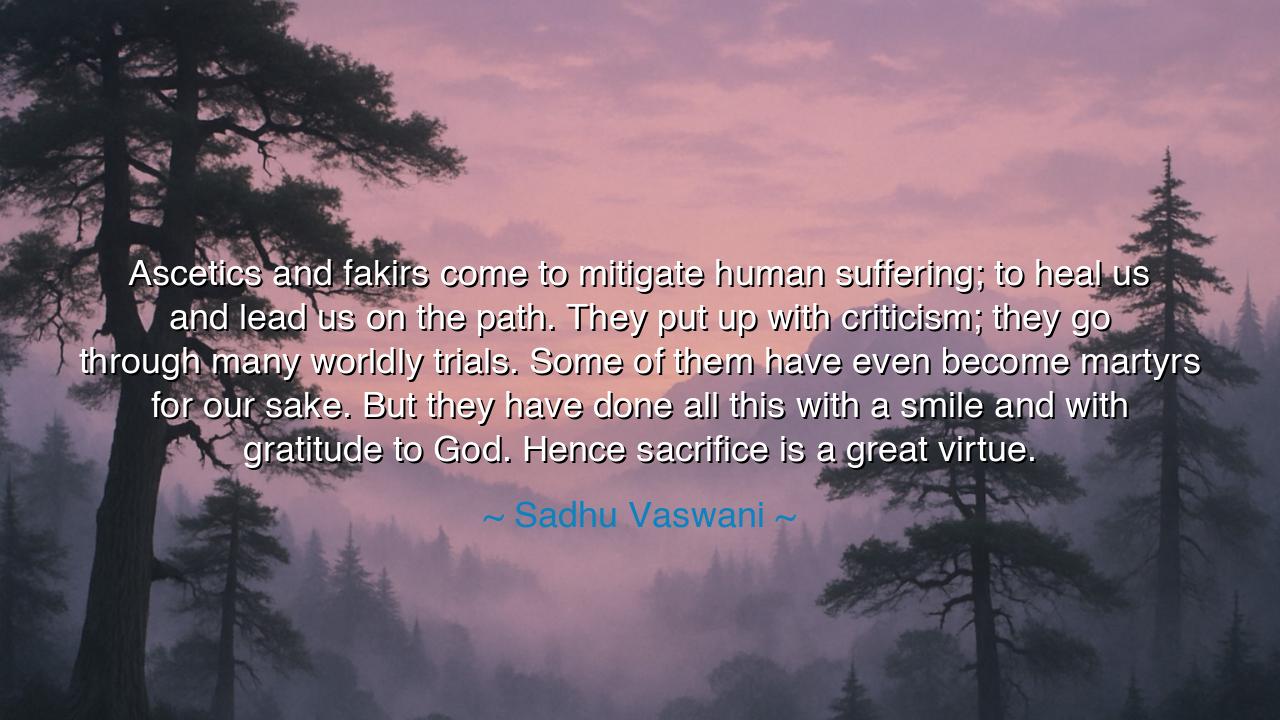
Ascetics and fakirs come to mitigate human suffering; to heal us
Ascetics and fakirs come to mitigate human suffering; to heal us and lead us on the path. They put up with criticism; they go through many worldly trials. Some of them have even become martyrs for our sake. But they have done all this with a smile and with gratitude to God. Hence sacrifice is a great virtue.






The words of Sadhu Vaswani shine like a beacon through the ages: “Ascetics and fakirs come to mitigate human suffering; to heal us and lead us on the path. They put up with criticism; they go through many worldly trials. Some of them have even become martyrs for our sake. But they have done all this with a smile and with gratitude to God. Hence sacrifice is a great virtue.” In this teaching, he honors the path of the selfless, those who willingly bear the burdens of others, and in their bearing, reveal that sacrifice is not misery, but a radiant gift.
The meaning of this teaching lies in the mystery of service. The ascetics and fakirs, renouncing comfort and ease, did not seek greatness for themselves but healing for humanity. They became lamps burning in the darkness, consuming their own substance so that others might walk safely. They bore insults, scorn, and persecution, yet met them with smiles—not the smile of denial, but the smile of one who knows that suffering borne in love is transformed into strength.
History gives us many who walked this path. Consider Saint Francis of Assisi, who cast off wealth to embrace poverty, who wandered barefoot through villages, mocked and dismissed by many. Yet his life of sacrifice awakened in others compassion, charity, and peace. He was scorned as a fool, yet he carried his trials with joy, singing hymns even in hunger and sickness. In him we see Vaswani’s truth: that sacrifice, embraced with gratitude, becomes the seed of transformation for all who witness it.
This path is not one of ease, but of fire. Those who sacrifice encounter worldly trials—loneliness, rejection, even martyrdom. Yet their greatness lies not only in enduring these trials, but in doing so without bitterness. To smile in the face of pain, to bow one’s head in gratitude even when unjustly burdened—this is a virtue higher than courage, for it transforms the soul into a mirror of the divine. Such souls remind us that true strength is not to conquer others, but to master oneself.
The origin of this wisdom is woven into the very fabric of human history. Every age has seen its saints, sages, and martyrs who bore suffering so others might see light. The prophets endured exile, the reformers bore chains, the peacemakers were slain. Yet even as they fell, their sacrifice awakened new life in those who followed. They are the living proof that sacrifice, though it wounds the flesh, feeds the spirit of generations.
The lesson for us is both humbling and empowering. We may not be called to the austerities of ascetics or the martyrdom of prophets, but we are called to embrace the spirit of sacrifice in daily life. This means giving without expectation, enduring hardships with patience, and meeting criticism not with anger but with calmness. To smile when tested, to thank God even in difficulty—these are acts of hidden greatness, shaping us into vessels of light.
Practically, this calls us to small but profound actions: to forgive when wronged, to offer time to those in need, to bear our own trials with dignity instead of complaint. In these ways, we too walk the path of the ascetics—not in renouncing the world, but in transforming our place within it. Each sacrifice, however small, becomes a thread woven into the tapestry of humanity’s healing.
So let us remember Sadhu Vaswani’s words: “Sacrifice is a great virtue.” It is not suffering that makes it great, but the spirit in which it is borne—smiling, grateful, devoted to God. If we live with such a spirit, our lives will not merely pass, but will become offerings, shaping the world into something brighter. For in sacrifice, joy is hidden; in surrender, power is revealed; and in the smile of one who suffers for love, we glimpse eternity itself.






AAdministratorAdministrator
Welcome, honored guests. Please leave a comment, we will respond soon